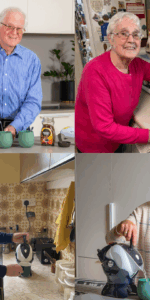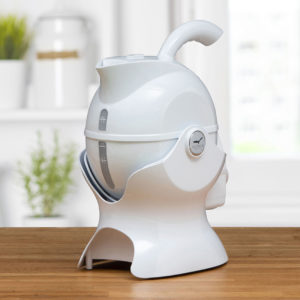April 11th is World Parkinson’s Day, we want to help spread awareness and understanding about the disease.
We’re here to share more about the disease, what it is, the known causes, symptoms, and possible treatment options available.
There are around 145,000 people in the UK living with Parkinson’s
Parkinson’s UK
What is Parkinson’s Disease?
It is a brain disorder that can lead to;
- Shaking
- Stiffness
- Coordination issues with walking and balancing.
Parkinson’s can affect both men and women, although men are statistically more likely to develop it. It is caused by a loss of nerve cells in a part of the brain called the ‘’substania nigra’’. These nerve cells are responsible for producing a chemical called dopamine (also known as the feel-good hormone).
Dopamine acts as the messenger between the brain and the nervous system, and this helps control and co-ordinate bodies movements.
If your nerve cells are damaged or die, the amount of dopamine in the brain is reduced and your messaging system between the brain and the nervous system isn’t working as well as it should. That means your bodies movements will become slower and/or abnormal.
There is no known cure for the disease but there are treatment options available to help.
Causes of Parkinson’s Disease?
We know that a loss of nerve cells can cause Parkinson’s. Symptoms of Parkinson’s disease usually develop when around 80% of the nerve cells have been lost. But what causes nerve cell loss?
It is believed that a combination of genetic changes and environmental factors may be responsible for the loss of nerve cells.
Genetics:
A number of genetic factors have been shown to increase the risk of developing Parkinson’s. You would need to discuss this further with your doctor. Parkinson’s can run in families, but it is rare for the disease to be inherited this way.
Environmental:
Some believe that environmental factors can increase your risk of developing Parkinson’s disease. There is research on whether pesticides and herbicides used in farming etc. can contribute to the condition, but it is not conclusive.
The symptoms generally develop slowly over the years. However, the progression of symptoms can be different from person to person because of the diversity of the disease.
Symptoms of Parkinson’s Disease?
Early symptoms of Parkinson’s can be easy to miss, especially if they occur sporadically. It may be time to speak with your doctor if you notice symptoms that keep appearing.
- Issues During Sleep:
Early signs can include a number of uncontrollable movements and this can/will be on a regular basis. Movements such as kicking, thrashing, flailing your arms, and even falling out of bed.
- Your Handwriting:
A sudden change in your handwriting could be an early sign of the disease. People living with Parkinson’s have a hard time controlling movement. This can make fine motor skills like writing more difficult.
- The Tremor:
The tremor is the most recognizable sign of Parkinson’s Disease. A small twitch or shake of a finger, hand, or foot is common.
- Stiffness & Slow Movements:
Stiffness of your limbs and slow movement appear early on in with Parkinson’s. You would notice jerkier motions and possibly move in a more uncoordinated pattern than before. You may have heard of those living with the diseases developing the ”shuffling gait’‘.
- Changes in Your Voice:
Parkinson’s can affect movement in many different ways and this can include how you speak. For those with advanced PD, they have slurred speech. Early on, less dramatic voice changes can occur and are worth listing out for.
Treatment Options Available:
There are treatment options available to help relieve the symptoms and maintain your quality of life. During the early stage, you may not even need treatment because the symptoms are mild. You will need regular checkups with your doctor/specialist for monitoring and treatment plans.
Supportive Therapies:
There are a number of therapy options available to help you deal with your symptoms on a day-to-day basis such as:
- Physiotherapy – this can help relieve muscle stiffness and joint pain through movement and exercise.
- Occupational Therapy – An OT can identify areas of difficulty in your day-to-day life and help you work out practical solutions to ensure your home is safe and properly set up for you. This will help you maintain your independence at home for longer. Occupational Therapists have recommended our Uccello Kettle. It will certainly make like easier in the kitchen.
- Speech & Language Therapy – Many with Parkinson’s have swallowing difficulties and problems with their speech. A speech and language specialist can help you improve these problems with speaking and swallowing exercises through assistive technology.
Medication:
You can be prescribed medication to help improve the main symptoms of Parkinson’s Disease. Your Doctor will be able to guide and provide more information.
Surgery:
Many people living with Parkinson’s Disease are treated through therapy and/or medication. There is a surgical option called ”deep brain stimulation”.
This involves surgically implanting a pulse generator (very like a pacemaker for the heart) in your chest wall. Once in place, tiny electric impulses run through the wires and this helps stimulate parts of the brain affected by Parkinson’s.
The surgery does not cure the disease, it simply eases the symptoms.













Leave a Comment